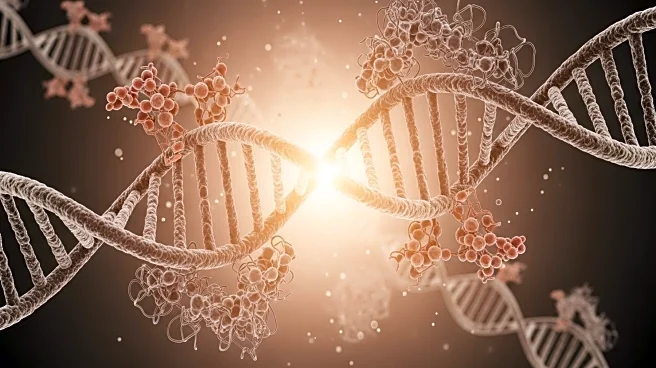What is the story about?
What's Happening?
Researchers at Mayo Clinic have identified a protein, KCTD10, that plays a crucial role in coordinating cellular processes during DNA replication. This discovery, published in Nature, advances the understanding of genomic stability and opens new avenues for cancer therapy development. KCTD10 acts as a molecular traffic controller, preventing collisions between DNA replication and transcription machinery, which are essential for cell division. The protein's function is critical because replication machinery moves faster than transcription machinery, posing risks of DNA damage and genomic instability, a hallmark of cancer. The study highlights KCTD10's role in maintaining genomic integrity and its potential as a therapeutic target, especially in cancer cells deficient in this protein.
Why It's Important?
The discovery of KCTD10's function has significant implications for cancer biology and therapy. The absence or malfunction of KCTD10 is linked to genomic instability, promoting mutations that lead to cancer. This vulnerability in cancer cells can be exploited for targeted treatments, potentially leading to therapies that selectively attack tumor cells while sparing healthy ones. The research provides a strategic focus for drug development, aiming to push cancer cells beyond their capacity to cope with DNA damage, leading to cell death. This insight could revolutionize precision oncology by translating molecular discoveries into impactful cancer therapies.
What's Next?
Future research will focus on understanding the prevalence of KCTD10 deficiency across various cancer types and screening for drugs that can selectively target cancer cells with this weakness. The Mayo Clinic's Precure initiative aims to develop predictive tools for early disease management, with KCTD10 as a potential biomarker. Continued studies on KCTD10 will deepen the understanding of cell division fidelity and genomic maintenance, potentially leading to breakthroughs in personalized cancer therapy.
Beyond the Headlines
The study suggests that the co-directional orientation of replication and transcription machinery may be an evolutionary strategy shaped by proteins like KCTD10 to minimize DNA damage. This highlights the complexity of intracellular coordination essential for life and reinforces the importance of regulated protein networks in genomic maintenance. The research also underscores the synergy between clinical medicine and biomedical research in advancing cancer therapies.

















